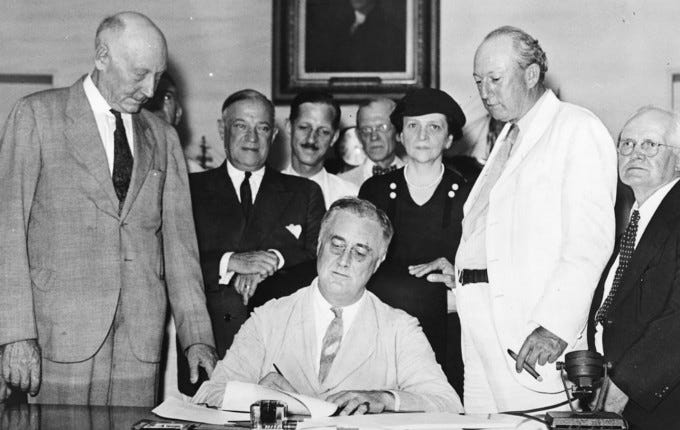Spare a thought for the principled conservatives who stand on the ramparts of democracy in defense of personal initiative against the encroaching embrace of government. They are ever outnumbered and fight an endless battle. They warn against what’s popular and apparently common-sensical. Yes, they say, this measure might fix today’s problem, but only by burdening tomorrow with the cost.
Until the 1930s Americans looked to themselves and their families to provide for old age. There wasn’t much old age to provide for. Life expectancy at birth in 1900 was 46 years for men and 48 for women. Most people, in fact, wouldn’t live to grow old. Of the hardy few who reached retirement, most would die within a handful of years. A modest nest egg, or a spare bedroom in the home of an adult child, would keep the wolf of old-age poverty from the door.
Yet reserving elder care to the individual and the family touched deeper themes. The American social contract had always placed the balance between liberty and security closer to the former. Americans were mostly free to handle their own affairs, but they had to accept the consequences. Government didn’t tell them where to live or what kind of work to do. In general it let them choose their own road through life. But neither did it rescue them when they fell into holes on that road. Doing so would burden others, through taxes. More important, it would sap the sense of individual responsibility that had made America what it was.
The ethos suited a nation of middling farmers, as America mostly was at its birth. But as the country changed, the ethos sometimes chafed and pinched. Farmers were their own masters, their fate their own doing. But as America industrialized, more and more Americans became beholden to bosses who might hire or fire them at the whim of market forces. Unemployment, a concept that hardly existed in early America, loomed as a constant specter over industrial workers. Americans were no longer the masters of their own fate. The old social contract had been broken.
Even as industrialization rendered Americans individually less secure, it made them collectively richer. More than few declared that in a nation as wealthy as America—the wealthiest in the world by the early twentieth century—no one should be condemned to poverty, especially through no fault of their own.
This last point was crucial, and it provided the critical mass needed to set the received model aside. The great depression of the 1930s cast tens of millions of workers out of jobs and often their families out of homes, through no fault of the sufferers’ own. Economists debated the causes of the depression: rampant speculation in the stock market during the 1920s, the collapse of international trade during the 1930s, mismanagement of the money supply by the Federal Reserve. But no one blamed the workers, who had no control over any of those things. They were the innocent victims.
Worst off were those workers at or near retirement who lost their jobs, and who often lost their life savings when American banks went bust, as they did by the thousands during the depression. Younger workers might ride out the depression and recover afterward. Older workers had no such temporal cushion.
The combination of need and blamelessness made possible a revision of the American social contract. Individual security gave way to social security. Risk was collectivized and America’s wealth was shared more evenly.
The Social Security Act of 1935 provided workers with old-age pensions and unemployment and accident insurance. The program was largely self-funded: workers paid into the system while employed, through payroll deductions, and received payments from the system when retired or unable to work.
The program was popular. Not least on the merits of Social Security, Franklin Roosevelt was reelected overwhelmingly in 1936. And it grew more popular with each decade that passed, as increasing numbers of Americans became dependent on their monthly Social Security checks.
Which was precisely what the conservatives had predicted and complained about. They had condemned the idea of Social Security during the debate in Congress ahead of passage of the act. They asserted that American individualism was in grave danger. Their opposition was sharpened by the knowledge that if they didn't kill the bill before it took effect, they would never be able to do so after. Americans would build life expectations around the new program. They would become addicted to dependence on government. They would lose the drive that had made the American economy the wonder of the world.
The dependence would grow over time: pensions today, health care tomorrow, who knew what else after that. Costs would be shifted to future generations. The process wouldn't end until it bankrupted America.
August 2025 will mark the ninetieth anniversary of Franklin Roosevelt's signing of the Social Security Act. Some of the conservatives predictions have come true. Americans' appetite for government programs has grown. Social Security itself has repeatedly been expanded. Medicare and Medicaid pay the medical bills for scores of millions of Americans. Dozens of other programs greatly expand the footprint of government in American life.
But America hasn't gone bankrupt. The American economy continues to thrive. American initiative and entrepreneurship remain undaunted.
This makes the conservatives' job harder still. You can't prove the sky is going to fall until it falls. Until then you sound like a crank.
Nor should you expect thanks if the sky finally does fall. You'll be accused of having brought it about. Or at least hoping it would happen.


It’s so simple people basically give money to the government now and get it later in the form of a safety net in old age. Businesses and elites just want people to be more dependent on them and have the need to work 60 and 80 hour weeks to make ends meet.
Plus, Social Security provided a model to be replicated in other nations, such as Canada.